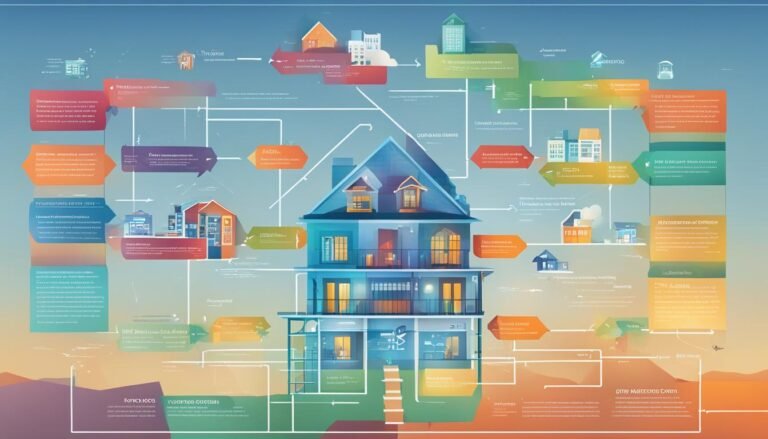Simplifying Managing Personal Debt Strategies
Managing personal debt can be overwhelming, but with the right strategies, you can take control of your finances and work towards a debt-free future. In this article, we will explore effective strategies for managing personal debt, including budgeting, debt consolidation, negotiating with creditors, and creating a realistic repayment plan.
Key Takeaways
- Understand your debt situation and create a comprehensive list of all your debts.
- Prioritize your debts based on factors such as interest rates and urgency of payment.
- Cut expenses and find ways to increase your income to free up more money for debt repayment.
- Create a realistic monthly budget that aligns with your financial goals.
- Consider debt consolidation if you have multiple debts with high-interest rates.
Understanding Your Debt Situation
The first step in managing personal debt is to understand your debt situation. By creating a comprehensive list of all your debts, you can gain clarity and develop a plan to tackle them effectively.
Creating a List of Debts
Start by listing down each debt you owe. Include the creditor’s name, outstanding balance, interest rate, minimum monthly payment, and due date. This list will serve as a roadmap for your debt management journey.
“Creating a list of debts allows you to have a clear overview of your financial obligations and take steps towards resolving them.” – Financial Expert
Whether it’s credit card debt, student loans, or a mortgage, including all your debts in one place will help you prioritize and strategize.
Prioritizing Your Debts
Next, prioritize your debts based on factors such as interest rates and urgency of payment. Higher interest rate debts may need to be addressed first to minimize overall interest costs.
Consider the consequences of not paying off certain debts. For example, failing to pay your mortgage could lead to foreclosure, while defaulting on credit card payments may negatively impact your credit score.
By understanding the consequences and prioritizing accordingly, you can focus your resources on the most pressing debts.
Developing a Repayment Plan
Once you have a clear picture of your debts and their priority, it’s time to develop a repayment plan. This plan should align with your financial goals and affordability.
Determine how much you can allocate towards debt repayment each month. Look for opportunities to cut back on expenses or increase your income to free up additional funds.
Remember that consistency is key. Stick to your repayment plan and maintain discipline throughout the process.
Negotiating with Creditors
Consider negotiating with your creditors for new terms or repayment plans. In some cases, creditors may be willing to reduce interest rates, waive late fees, or offer more manageable payment schedules.
Contact your creditors directly and explain your situation. Be prepared to provide documentation to support your request, such as proof of financial hardship or a detailed repayment proposal.
Negotiating with creditors can help make your debt more manageable and potentially save you money over the long term.
Understanding your debt situation is essential for effective debt management. By creating a comprehensive list of debts, prioritizing them, developing a repayment plan, and negotiating with creditors, you can take control of your personal debt and work towards a debt-free future.
Cutting Expenses and Increasing Income
To free up more money for debt repayment, it’s essential to find ways to cut expenses and increase your income. By carefully analyzing your budget and making strategic adjustments, you can create more financial flexibility to tackle your debts effectively.
Reducing Discretionary Spending
One of the easiest ways to cut expenses is by reducing discretionary spending. Review your budget and identify areas where you can make cuts without sacrificing your basic needs. Consider cutting back on non-essential items such as dining out, entertainment subscriptions, and impulse purchases. By becoming more mindful of your spending habits, you can redirect those funds towards your debt repayment goals.
Lowering Utility Bills
Another effective way to cut expenses is by lowering your utility bills. Take steps to conserve energy, such as using energy-efficient appliances, adjusting the thermostat, and turning off lights and electronics when not in use. Additionally, explore options to switch to cheaper utility providers or negotiate lower rates with your existing providers. These small changes can add up over time and help you save money on your monthly bills.
Increase Your Income
In addition to cutting expenses, increasing your income can provide additional financial resources to repay your debts faster. Consider taking on part-time work or freelancing opportunities that align with your skills and interests. Alternatively, explore the possibility of working additional shifts or pursuing higher-paying job opportunities. By dedicating extra time and effort towards increasing your income, you can accelerate your debt repayment progress.
| Ways to Cut Expenses | Ways to Increase Income |
|---|---|
| Reduce discretionary spending | Take on part-time work |
| Lower utility bills | Freelancing opportunities |
| Avoid unnecessary subscriptions | Work additional shifts |
| Minimize impulse purchases | Pursue higher-paying job opportunities |
By implementing both expense-cutting and income-increasing strategies, you can create a more substantial financial cushion to allocate towards your debt repayment goals. Remember, every dollar saved and earned counts towards making progress on your journey to financial freedom.
Creating a Realistic Budget
When it comes to managing personal debt, one of the most crucial steps is creating a realistic budget. A budget helps you understand your financial situation, control your spending, and allocate resources towards debt repayment effectively. By tracking your income and expenses diligently, you can make adjustments as necessary to reach your debt management goals.
Developing a new budget requires careful consideration of your income, expenses, and debt obligations. Start by calculating your total monthly income from all sources, including salaries, investments, and any other sources of revenue. Next, list all your monthly expenses, including fixed costs such as rent or mortgage payments, utility bills, groceries, transportation, and discretionary spending.
Once you have a clear understanding of your income and expenses, it’s time to evaluate where you can make adjustments. Look for areas where you can cut back on expenses without sacrificing your basic needs. This could mean reducing discretionary spending, renegotiating contracts and subscriptions, or finding more cost-effective alternatives.
In addition to reducing expenses, consider ways to increase your income. Are there opportunities for a side hustle, freelancing, or taking on additional work? Increasing your revenue can provide extra resources to accelerate your debt repayment efforts.
Remember, the key to a realistic budget is to strike a balance between your debt management goals and your daily needs. Allocate a portion of your income towards debt repayment while ensuring you have enough for essential expenses and a small buffer for unexpected costs.
To illustrate, here’s a visual representation of how you can allocate your monthly income:
| Income Source | Amount |
|---|---|
| Salary | $3,000 |
| Side Hustle | $500 |
| Total Income | $3,500 |
| Expense Category | Amount |
|---|---|
| Rent/Mortgage | $1,200 |
| Utilities | $200 |
| Groceries | $300 |
| Transportation | $150 |
| Discretionary Spending | $500 |
| Debt Repayment | $1,250 |
| Emergency Fund | $0 |
| Total Expenses | $3,600 |
In this example, there’s a deficit of $100, indicating that some adjustments need to be made. You can either identify areas where you can reduce expenses or explore options to increase your income to ensure your budget remains realistic and manageable.
Creating a realistic budget is an ongoing process. Regularly review and analyze your spending patterns to make necessary adjustments and ensure you’re still on track with your debt management goals. By managing your finances effectively, you’ll be one step closer to achieving a debt-free future.
Exploring Debt Consolidation
If you have multiple debts with high-interest rates, debt consolidation can be a viable option to simplify your repayment process and potentially save money on interest payments. Debt consolidation involves combining all your debts into a single loan with a lower interest rate.
By consolidating your debts, you can:
- Streamline your repayment process into one convenient monthly payment
- Lower your overall interest rate
- Extend your repayment term, reducing the monthly payment amount
Debt consolidation can provide a sense of relief by eliminating the need to keep track of multiple due dates and managing different interest rates. It allows you to focus on a single debt repayment plan, making it easier to stay organized and on top of your financial responsibilities.
To determine if debt consolidation is right for you, consider the following:
- Evaluate the total amount of your debts to ensure it is feasible to consolidate them
- Check the interest rate of the consolidation loan and confirm it is lower than your existing interest rates
- Research potential fees and charges associated with the consolidation process
- Review the terms and conditions of the consolidation loan to understand the repayment period and any penalties for early repayment
Debt consolidation can be a strategic solution to simplify your financial obligations and expedite your journey toward debt freedom. However, it is crucial to thoroughly research and understand the terms and conditions of any consolidation loan before proceeding.
Building an Emergency Fund
As you work on debt repayment, it’s crucial to simultaneously build an emergency fund. Having an emergency fund acts as a financial safety net to shield you from unexpected expenses or emergencies, preventing the need for future borrowing. Start setting aside a portion of your income each month towards building a comfortable emergency fund.
Unexpected expenses can arise at any time, such as medical emergencies, home repairs, or job loss. These unforeseen events can disrupt your financial stability and derail your debt repayment progress. However, with a well-established emergency fund, you’ll have a safety net to fall back on, minimizing the impact of these unexpected expenses on your overall financial health.
Allocate a portion of your income towards your emergency fund as a priority. Even if you have outstanding debts, it’s important to divert some funds towards this fund. Start small and gradually increase the amount as your financial situation improves.
Consider setting up a separate bank account specifically for your emergency fund. This separation will help prevent any temptation to dip into these funds for non-essential expenses.
Having a solid emergency fund in place provides peace of mind and confidence to handle unexpected situations without relying on credit cards or loans. It’s an essential component of your overall financial well-being and contributes to your long-term financial stability.
Benefits of an Emergency Fund:
- Protects you from high-interest borrowing in case of unexpected expenses
- Reduces financial stress and anxiety
- Ensures you have funds readily available for emergencies
How much should be in your Emergency Fund?
The amount of money you should save in your emergency fund varies based on your individual circumstances. A general guideline is to aim for 3 to 6 months’ worth of living expenses. However, factors such as job security, dependents, and existing debt obligations should be considered when determining the ideal amount for your emergency fund.
| Earnings | Monthly Living Expenses | Ideal Emergency Fund |
|---|---|---|
| $2,000 | $1,500 | $9,000 – $18,000 |
| $4,000 | $3,000 | $18,000 – $36,000 |
| $6,000 | $4,500 | $27,000 – $54,000 |
“An emergency fund is like insurance for your finances. It provides a sense of security amid unexpected events, giving you the freedom to navigate these situations without incurring further debt.”
Building an emergency fund alongside your debt repayment efforts will give you a solid foundation for your financial future. It’s a wise financial move that will protect you from unexpected expenses and provide financial peace of mind. Start saving today and watch your emergency fund grow.
Seeking Professional Advice
If you’re struggling to manage your debts effectively, it may be time to seek guidance from a trusted financial advisor. A financial advisor can provide personalized assistance tailored to your specific situation, offering valuable insights and expert advice to help you overcome your debt challenges.
An experienced financial advisor will take the time to understand your unique financial circumstances and goals. They will analyze your debt situation, income, and expenses to develop a comprehensive understanding of your financial picture. This personalized approach ensures that the guidance provided is relevant and tailored specifically to your needs.
With their expertise, a financial advisor can help you create a customized debt management plan designed to address your individual goals and challenges. They will work with you to explore various strategies for tackling your debt, which may include debt consolidation, negotiating with creditors, or implementing a structured repayment plan.
One of the key advantages of seeking professional advice is access to their knowledge and experience in navigating the complexities of debt management. They can help you understand the potential impact of different debt management strategies on your overall financial well-being, empowering you to make informed decisions about your debt repayment journey.
The Benefits of Working with a Financial Advisor:
- Expertise in debt management strategies
- Personalized guidance based on your unique situation
- Access to a wide range of financial tools and resources
- Assistance in developing a realistic and sustainable debt management plan
- Ongoing support and monitoring to ensure progress towards your financial goals
While seeking professional advice may involve some financial investment, the potential benefits far outweigh the costs. The personalized guidance and expertise of a financial advisor can help you save money in the long run by avoiding costly mistakes and optimizing your debt repayment strategy.
Remember, seeking professional advice does not mean relinquishing control of your finances; instead, it offers valuable support and expertise to help you navigate the complexities of debt management confidently.
Now that we’ve explored the importance of seeking professional advice, the next section will focus on staying committed and positive throughout your debt management journey.
Staying Committed and Positive
Managing personal debt can be a challenging journey, but staying committed to your debt management strategies is crucial for success. By maintaining a positive mindset and celebrating small victories along the way, you can gradually regain control of your finances and work towards a debt-free future.
“Success is not final, failure is not fatal: It is the courage to continue that counts.”
– Winston Churchill
Commitment is the key to overcoming financial challenges and achieving your debt management goals. Understand that debt management takes time and effort, and setbacks may occur. But by staying positive and dedicated to your plan, you can overcome these obstacles and move forward towards a brighter financial future.
Here are a few strategies to help you stay committed and positive on your debt management journey:
- Set achievable goals: Break down your debt repayment into smaller, manageable goals. This allows you to celebrate milestones along the way, giving you a sense of accomplishment and motivation to continue.
- Track your progress: Keep a record of your debt reduction progress to visually see how far you’ve come. Use a debt tracker spreadsheet or chart to monitor your decreasing debt balance, which can serve as a visual reminder of your commitment and progress.
- Stay accountable: Share your debt management goals with a trusted friend or family member who can offer support and hold you accountable for achieving your targets. Having someone to share your journey with can provide encouragement and help you stay on track.
- Reward yourself: Treat yourself when reaching significant milestones in your debt repayment journey. Set small rewards for yourself when achieving certain goals, such as paying off a specific debt or reaching a certain percentage of overall debt reduction.
- Practice self-care: Take care of your mental and emotional well-being during this challenging time. Engage in activities that help you relax and reduce stress, such as exercise, meditation, or spending time with loved ones.
Remember, staying committed and positive during your debt management journey is essential. It may not always be easy, but by consistently following your debt management strategies and maintaining a positive mindset, you can overcome financial obstacles and work towards a debt-free future.
Example Debt Reduction Progress Chart:
| Month | Starting Balance | Payment | Remaining Balance |
|---|---|---|---|
| January | $10,000 | $500 | $9,500 |
| February | $9,500 | $500 | $9,000 |
| March | $9,000 | $500 | $8,500 |
| April | $8,500 | $500 | $8,000 |
| May | $8,000 | $500 | $7,500 |
Improving Financial Literacy
Educate yourself about personal finance and financial literacy to make informed decisions about your finances. Understanding key concepts can empower you to take control of your financial well-being and make smarter choices for a more secure future.
Key Concepts to Enhance Your Financial Literacy
Developing a strong foundation in personal finance can provide valuable insights and tools for managing your debt effectively. Here are some essential concepts to understand:
- Interest Rates: Learn how interest rates impact your debts and investments. Understand the difference between fixed and variable rates, compound interest, and how they affect your financial decisions.
- Credit Scores: Familiarize yourself with credit scores and their significance. Know how to establish and maintain a good credit score, as it plays a crucial role in securing favorable interest rates and financing options.
- Financial Planning: Gain insights into creating a comprehensive financial plan. Learn about budgeting, setting financial goals, and effectively managing your income and expenses.
The Importance of Informed Decisions
Financial literacy empowers you to make informed decisions about your money, leading to better financial outcomes and increased confidence in managing your debt. When you have a deep understanding of personal finance, you can:
- Recognize and avoid common financial pitfalls that may lead to unnecessary debt or financial strain.
- Evaluate different debt management strategies and select the most suitable options for your situation.
- Maximize your potential for long-term wealth accumulation and financial stability.
Continuing Your Financial Education
The journey towards improving your financial literacy is ongoing. Continue expanding your knowledge through various resources:
- Read books and articles written by reputable financial experts.
- Participate in financial literacy workshops or webinars.
- Follow trustworthy personal finance websites, podcasts, or YouTube channels.
Stay Informed and Take Charge of Your Finances
By investing time and effort into improving your financial literacy, you can make informed decisions and confidently tackle your personal debt. Building your knowledge and skills will lead to greater financial resilience, helping you navigate challenges and achieve your long-term financial goals.
Strategies for Managing Business Debt
When it comes to managing business debt, a different set of strategies is required to ensure financial stability and success. By implementing the right approaches, you can effectively address your business debt and pave the way for long-term growth. Here are some key strategies to consider:
1. Improve Cash Flow Management
One of the fundamental aspects of managing business debt is to focus on improving cash flow management. By carefully monitoring your incoming and outgoing cash, you can identify areas where you can optimize your revenue and reduce unnecessary expenses. This includes accurately forecasting future cash flows, implementing efficient invoicing and payment procedures, and negotiating favorable terms with suppliers.
2. Refinance or Restructure Debt
If your business is struggling with high-interest debt, refinancing or restructuring your existing debt can be an effective solution. This involves renegotiating loan terms with lenders to secure lower interest rates or longer repayment periods. By doing so, you can reduce your monthly debt payments and improve your overall financial obligations.
3. Cut Expenses
An essential strategy for managing business debt is to identify and cut unnecessary expenses. Conduct a thorough review of your business operations and expenses, pinpointing areas where you can reduce costs without compromising the quality of your products or services. This may involve renegotiating contracts with suppliers, finding more cost-effective suppliers, or implementing energy-saving measures to reduce utility bills.
4. Increase Revenue
To combat business debt effectively, it’s crucial to explore opportunities for increasing your revenue streams. This may involve diversifying your product or service offerings, expanding into new markets, or implementing targeted marketing strategies to attract more customers. By consistently boosting your revenue, you can create a sustainable business model that supports debt repayment and future growth.
Remember, managing business debt requires a proactive approach that focuses on cash flow management, refinancing or restructuring debt, cutting expenses, and increasing revenue. By implementing these strategies, you can navigate your business towards financial stability and pave the way for long-term success.
| Strategy | Description |
|---|---|
| Improve Cash Flow Management | Monitor and optimize your business’s cash inflows and outflows to ensure efficient financial management. |
| Refinance or Restructure Debt | Negotiate new loan terms with lenders to reduce interest rates or extend repayment periods. |
| Cut Expenses | Identify and eliminate unnecessary expenses to free up resources for debt repayment. |
| Increase Revenue | Implement strategies to grow your business’s revenue and improve its financial position. |
Conclusion
Managing personal debt can be challenging, but with effective debt management strategies, careful budgeting, and the possibility of debt consolidation, you can take control of your finances and work towards a financially stable, debt-free future. It’s important to remember that every financial situation is unique, so tailor these strategies to fit your specific needs and goals.
When faced with personal debt, it’s crucial to have a clear plan in place. By being proactive and committed to your debt management goals, you can regain control of your finances and achieve financial stability. Consider seeking professional advice from a reputable financial advisor who can provide personalized guidance and help you develop a customized debt management plan.
Remember, managing personal debt is a journey, and it requires patience and perseverance. Celebrate small victories along the way and stay positive throughout the process. By staying committed to your debt management strategies, educating yourself about personal finance, and making informed decisions, you can pave the way for a bright and debt-free future. Good luck on your debt management journey!







